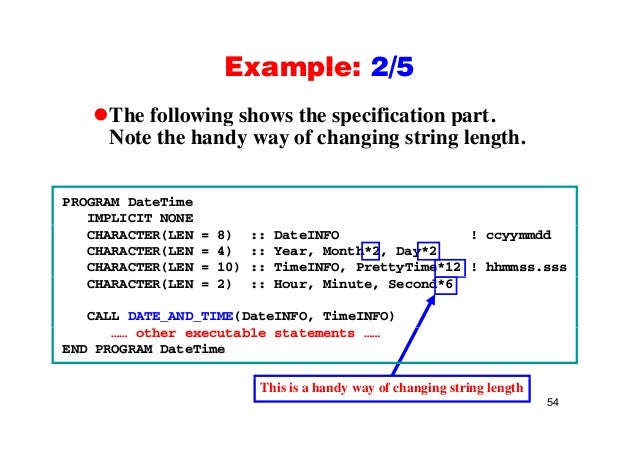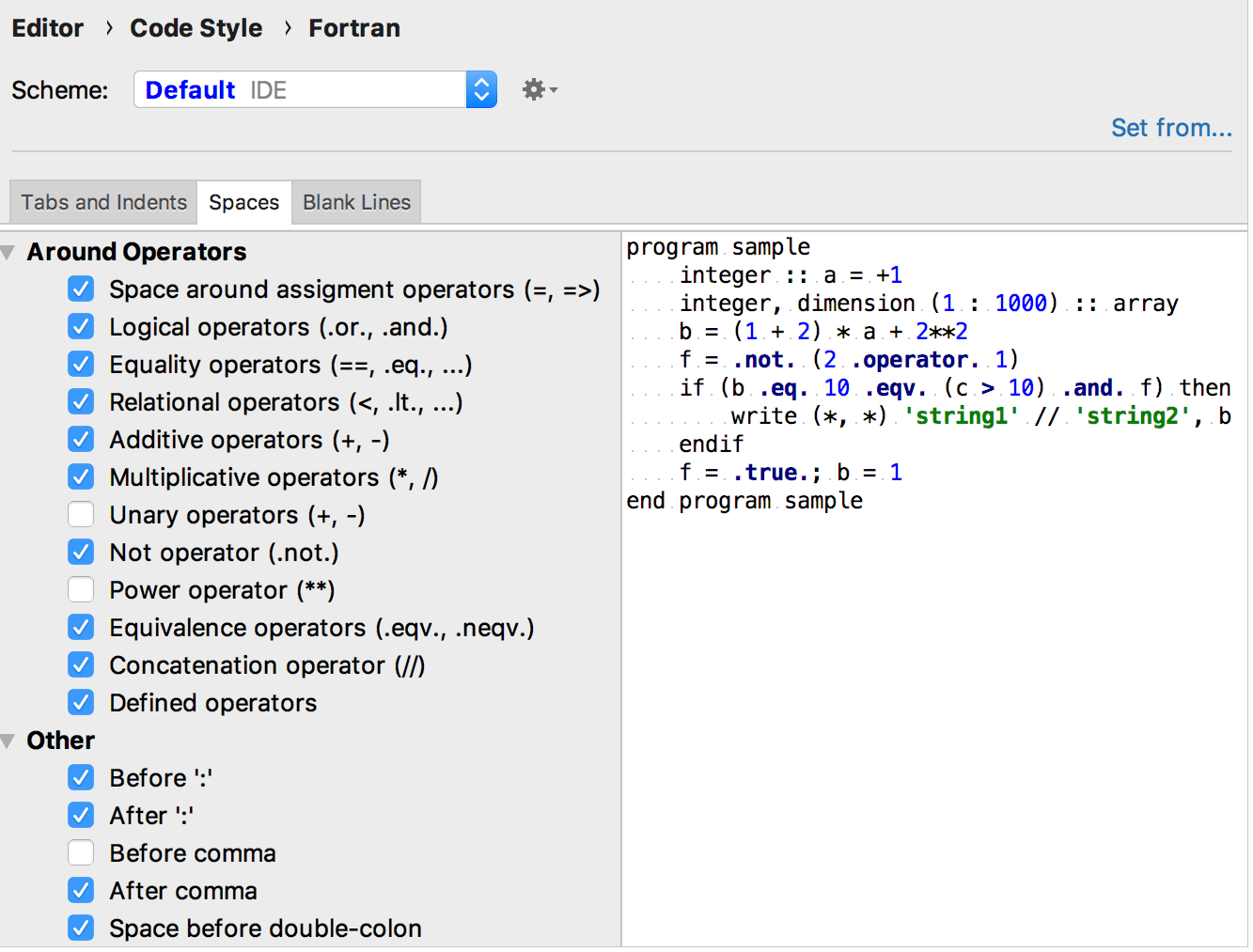Build Faster Code Faster

Fortran for mac osx free download. Burn Create data discs with advanced data settings. Fortran 90 compiler. Fortran compiler windows 10. With Fortran it is not a problem at all because they work together flawlessly. You only need to pay attention to the functions signature in C and translate them to Fortran 77 using the%VAL and%REF auxiliary constructors (Even though this works for Fortran 90+ too, I'd recommend you to use the standard isocbinding module than what's. File names ending in.f90 and.f95 are assumed to be free source form - suitable for Fortran 90/95 compilation. File names ending in.f and.for are assumed to be assumed fixed form source - compatible with old Fortran 77 compilation. Compiling a program The role of g95 Fortran compiler is to compile your Fortran source code into an. Precompiled binaries (executables) are available for Windows, Linux, Mac OS X, the old Mac OS (PPC), etc. Silverfrost FTN95 Personal Edition. Silverfrost FTN95 is a Fortran 95 compiler that supports Fortran 77, Fortran 90 and Fortran 95. The compiler generates 32-bit and 64-bit exectuables for Windows and the Microsoft.NET framework. CCRG GNU Fortran 95 Compiler v.20030418 Patches for GNU Fortran 95 Compiler. Contributed by Creative Compiler Research Group. IBM XL C/C v.6.0 IBM XL C/C 6.0 is an advanced program which satisfies you because it works great and has a friendly interface. Preview Beta compilers for Mac OS X. IBM is preparing its industry-leading C, C.
Fortran 90 Compiler Mac
Pro Fortran 2021 combines performance and features not available from any other Fortran vendor.
Fortran 90 Compiler Mac
- Industry-leading performance
- Robust, parallel, scalable code
- Easy-to-use, Fortran/C IDE or command prompt, speeds development
- AWE Fortran application framework, HPC, Data Access and Math Libraries
- 2D/3D Graphics
- Windows, OS X, and Linux have the same look, feel, and functionality
- Dynamic, mixed floating licenses available
- Industry’s best tech support includes live phone technicians
- Special bundle pricing for optional IMSL Numerical Libraries available
Windows Bonus – GINO GUI Lite a $395 value – Included FREE!
Interested in knowing more about Absoft?
Choosing the right compiler is important, so it makes sense to do some research about an organization before making a choice.
- Find out what customers are saying about us
- See a small sample of companies that use Pro Fortran
- Contact our sales team to learn more about your options
Introducing Absoft Pro Fortran
Take a look at the video below to learn more about our compiler:
Click here to view more Pro Fortran how-to videos from Absoft.
Designed to build code in the most efficient way possible, the Pro Fortran compiler utilizes advanced technology. This includes load balancing, AVX and OpenMP 3.1 support, AMDAL HPC scientific and engineering math library, Parallel versions of Lapack and BLAS libraries, Fast Data Visualization, and much more. We’re continually improving our Pro Fortran tool suite, and the Absoft Fortran IDE—the only commercial Fortran IDE developed by Fortran experts. By developers. For developers.
The Mac OS X operating system is a variant of unix (called Darwin, which is a derivative of BSD unix). It is a versatile computing platform suitable both for computational chemistry calculations and for developing and compiling programs.
Although scientific programs use a variety of languages (basic, pascal, c, java, perl, python, ...), a substantial base of scientific code is written in fortran. Most (though not all) computational engines supported by WebMO are written in fortran. This resource concentrates on fortran compilers and the tools needed to support them.
While integrated development environments (IDE's) are useful in supporting program development, this resource concentrates on the command line interface (CLI) using the Terminal application that is supplied with OS X.
The procedures discussed on this page have been designed for Mac OS X 10.5.
SOFTWARE DEVELOPMENT UTILITIES AND c COMPILER
Command line program development often uses unix utilities (cvs, make, ranlib, ...) when developing and compiling a project. These utilities, together with the c compiler for OS X, are available as part of the Xcode Tools that come with OS X. However, they are not installed by default.
- Insert Mac OS X Installation DVD. Navigate to the Optional Installs: Xcode Tools folder.
- Double-click XcodeTools.mpkg. Follow the prompts, but at Installation Type, click the Customize button.
- Uncheck all the components and check only Unix Development Support. In particular, Developer Tools Essentials should be unchecked (saving you 2.5GB of disk space)!
- Provide your password for the installation will proceed.
- Notes:
- The latest version of Xcode Tools can be obtained by registering for a free ADC membership and then downloading the latest version of Xcode from Apple (caution: it is > 1GB!).
- Xcode can be uninstalled by running
as described in the Xcode Tools Uninstaller
- The latest version of Xcode Tools can be obtained by registering for a free ADC membership and then downloading the latest version of Xcode from Apple (caution: it is > 1GB!).
g77 COMPILER
g77 is the gnu fortran77 compiler. It was last produced with gnu compiler collection (gcc) 3.4, and has since been supplanted with gfortran which supports fortran95. Because of the free-cost and high quality of the gnu copmpilers, a significant amount of software has been developed for and compiled with the g77 compiler.
A tar file of the final realease of g77 compiled for OS X exists at High Performance Computing for Mac OS X.

- Download g77-intel-bin.tar.gz (Intel Mac only) or g77-bin.tar.gz (PowerPC only)
- If your browser did not automatically unzip the file, then$ gunzip g77-bin-intel.tar.gz
- Install the distribution
which puts everything in /usr/local - Notes:
- No uninstall script exists, so the install files need to be listed from the tar file and manually deleted. The following command automates the process of deleting all installed files and empty directories:$ tar -tf g77-bin.tar | sort -r | (cd /; xargs -p -n 1 rm -d)You may wish to replace the '-p' switch with '-t' so that you are not prompted to delete each file.
- G77 documentation is available at GCC Online Documentation
- No uninstall script exists, so the install files need to be listed from the tar file and manually deleted. The following command automates the process of deleting all installed files and empty directories:
gfortran COMPILER
gfortran is the new gnu fortran compiler, which attempts to follow the fortran95 standard. As such, it should be backward compatible with fortran77 and fortran90. It also promises to attempt following future fortran standards, such as fortran2003. gfortran replaces the gnu g77 compiler and is included with gnu compiler collection (gcc) 4.0 and higher.
Although Apple XCode Tools includes gcc 4.X, it is not a complete implementation and lacks gfortran. However, various implementations of gfortran have been compiled and are available at GCC Wiki GFortranBinaries, Tools - R (and Fortran) for Mac OS X, or High Performance Computing for Mac OS X. These implementations vary by version, platform supported, and integration with XCode Tools. Important: Install only one implementation of gfortran, as each version would overwrite portions of the others!
- The 'GCC Wiki' implementation described in the following procedure is typically the newest binary release of gfortran, but requires that you download a version appropriate for your architecture.
- Visit the GCC Wiki GFortranBinaries page and scroll to the MacOS section
- Download gfortran-macosx-x86.dmg (Intel) or gfortran-macosx-ppc.dmg (PowerPC)
- If your browser did not automatically mount the disk image, the double-click the dmg file to mount and open it
- Open the gfortran-macosx-{architecture}-{version} folder, double-click gfortran.pkg, and follow the prompts to install it
- Notes:
- All gfortran files are installed in /usr/local/gfortran, and a single symbloic link /usr/local/bin/gfortran is created. Thus, to uninstall the package, run$ sudo rm -r /usr/local/gfortran /usr/local/bin/gfortran
- GNU Fortran documentation is available at GCC Online Documentation
- All gfortran files are installed in /usr/local/gfortran, and a single symbloic link /usr/local/bin/gfortran is created. Thus, to uninstall the package, run
- The 'sourceforge' implementation described in the following procedure requires that you download a version appropriate for your architecture, does not produce 'fat binaries', and does not come with an uninstall script (although a method is provided below)
- Download gfortran-leopard-intel-bin.tar.gz (Intel) or gfortran-leopard-ppc-bin.tar.gz (Power PC)
- If your browser did not automatically unzip the file, then
- Install the distribution$ sudo tar -xvf gcc-leopard-intel-bin.tar -C /which puts everything in /usr/local
- Notes:
- No uninstall script exists, but the following command will delete all installed files and empty directories:$ tar -tf gfortran-leopard-intel-bin.tar | sort -r | (cd /; xargs -p -n 1 rm -d)You may wish to replace the '-p' switch with '-t' so that you are not prompted to delete each file.
- GNU Fortran documentation is available at GCC Online Documentation
- No uninstall script exists, but the following command will delete all installed files and empty directories:
- Download gfortran-leopard-intel-bin.tar.gz (Intel) or gfortran-leopard-ppc-bin.tar.gz (Power PC)
- Note that there is a G95 project, which is completely independent of the gnu gfortran project (despite the similarity with the gnu g77 compiler name). The G95 project is not associated with the gnu compiler collection!
f2c TRANSLATOR / f77 COMPILER f2c is a fortran77-to-c source code translator. Because f2c is written in c and its ouput is c, both of which can be compiled natively on unix operating systems, f2c offers a very transportable compiler solution for compiling fortran programs. f2c also offers a means of converting large fortran libraries, such as LAPACK, into c. f2c is still actively maintained and is available at http://www.netlib.org/f2c/.

f77 was the first complete fortran77 compiler and was written in c. The original f77 program is no longer available for current computer architectures. However, f2c is based on the original f77 program, and the f2c distribution contains a f77 wrapper script that combines the f2c translation and c compilation steps. The f77 script also supports many command line options commonly associated with fortran compilers. Since the f77 script calls f2c, which in turn is based upon the original f77 program, the f77 script within the f2c distribution represents the most current implementation of the original f77 program.
- Download the installation script install_f2c_osx.csh which is
- Run installation script$ chmod +x install_f2c_osx.cshwhich will produce the following files:
$ sudo ./install_f2c_osx.csh
/usr/local/bin/f2c
/usr/local/include/f2c.h
/usr/local/lib/libf2c.a
/usr/local/man/man1/f2c.1t
/usr/local/bin/f77 - Translate, compile, link, and run a program$ f2c hello.fOr combine the first three steps into a single command
$ gcc -c hello.c
$ gcc -o hello hello.o -lf2c -lm
$ ./hello - To uninstall f2c, manually delete the five files produced above
Tools - R (and Fortran) for Mac OS X
High Performance Computing for Mac OS X
GNU Fortran
FINK: GNU Compiler Collection Version 4.3 (includes gfortran)
The G95 Project
f2c
IBM XL Fortran Compiler for Macintosh OS X
Absoft Fortran for OS X
PGI Fortran Workstation
NAG Fortran Compiler
Fortran Tools and Libraries
Open Directory - Computers: Programming: Languages: Fortran
Help for Fortran and Fortran90 Programming
Fortran 90 for the Fortran 77 Programmer
Summary of Fortran 95 Language
A Summary of Fortran
Fortran 90 Notes
The GNU Fortran Compiler